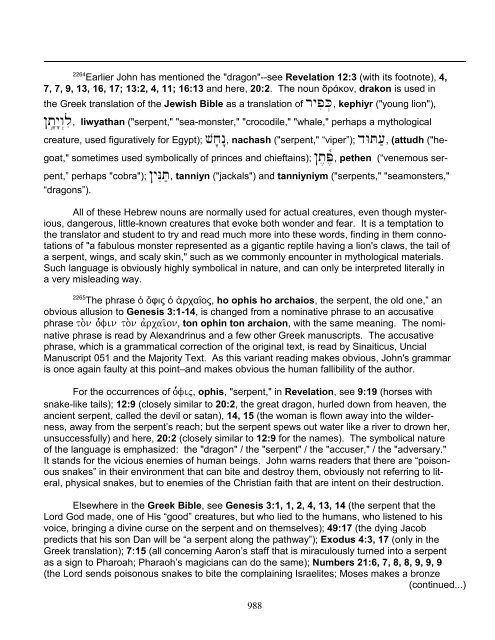Revelation 20 - In Depth Bible Commentaries
Revelation 20 - In Depth Bible Commentaries
Revelation 20 - In Depth Bible Commentaries
You also want an ePaper? Increase the reach of your titles
YUMPU automatically turns print PDFs into web optimized ePapers that Google loves.
2264<br />
Earlier John has mentioned the "dragon"--see <strong>Revelation</strong> 12:3 (with its footnote), 4,<br />
7, 7, 9, 13, 16, 17; 13:2, 4, 11; 16:13 and here, <strong>20</strong>:2. The noun äñÜêïí, drakon is used in<br />
the Greek translation of the Jewish <strong>Bible</strong> as a translation of rypiK., kephiyr ("young lion"),<br />
!t"åy"w>li, liwyathan ("serpent," "sea-monster," "crocodile," "whale," perhaps a mythological<br />
creature, used figuratively for Egypt); vx'n", nachash ("serpent," “viper”); dWT[;, (attudh ("hegoat,"<br />
sometimes used symbolically of princes and chieftains); !t,Pñ,, pethen (“venemous serpent,”<br />
perhaps "cobra"); !yNIT;, tanniyn ("jackals") and tanniyniym ("serpents," "seamonsters,"<br />
“dragons”).<br />
All of these Hebrew nouns are normally used for actual creatures, even though mysterious,<br />
dangerous, little-known creatures that evoke both wonder and fear. It is a temptation to<br />
the translator and student to try and read much more into these words, finding in them connotations<br />
of "a fabulous monster represented as a gigantic reptile having a lion's claws, the tail of<br />
a serpent, wings, and scaly skin," such as we commonly encounter in mythological materials.<br />
Such language is obviously highly symbolical in nature, and can only be interpreted literally in<br />
a very misleading way.<br />
2265<br />
The phrase öéò ñ÷áïò, ho ophis ho archaios, the serpent, the old one,” an<br />
obvious allusion to Genesis 3:1-14, is changed from a nominative phrase to an accusative<br />
phrase to.n ov,fin to.n avrcai/on, ton ophin ton archaion, with the same meaning. The nominative<br />
phrase is read by Alexandrinus and a few other Greek manuscripts. The accusative<br />
phrase, which is a grammatical correction of the original text, is read by Sinaiticus, Uncial<br />
Manuscript 051 and the Majority Text. As this variant reading makes obvious, John's grammar<br />
is once again faulty at this point–and makes obvious the human fallibility of the author.<br />
For the occurrences of ov ,fij, ophis, "serpent," in <strong>Revelation</strong>, see 9:19 (horses with<br />
snake-like tails); 12:9 (closely similar to <strong>20</strong>:2, the great dragon, hurled down from heaven, the<br />
ancient serpent, called the devil or satan), 14, 15 (the woman is flown away into the wilderness,<br />
away from the serpent’s reach; but the serpent spews out water like a river to drown her,<br />
unsuccessfully) and here, <strong>20</strong>:2 (closely similar to 12:9 for the names). The symbolical nature<br />
of the language is emphasized: the "dragon" / the "serpent" / the "accuser," / the "adversary."<br />
It stands for the vicious enemies of human beings. John warns readers that there are “poisonous<br />
snakes” in their environment that can bite and destroy them, obviously not referring to literal,<br />
physical snakes, but to enemies of the Christian faith that are intent on their destruction.<br />
Elsewhere in the Greek <strong>Bible</strong>, see Genesis 3:1, 1, 2, 4, 13, 14 (the serpent that the<br />
Lord God made, one of His “good” creatures, but who lied to the humans, who listened to his<br />
voice, bringing a divine curse on the serpent and on themselves); 49:17 (the dying Jacob<br />
predicts that his son Dan will be “a serpent along the pathway”); Exodus 4:3, 17 (only in the<br />
Greek translation); 7:15 (all concerning Aaron’s staff that is miraculously turned into a serpent<br />
as a sign to Pharoah; Pharaoh’s magicians can do the same); Numbers 21:6, 7, 8, 8, 9, 9, 9<br />
(the Lord sends poisonous snakes to bite the complaining Israelites; Moses makes a bronze<br />
(continued...)<br />
988

















